Pawnshop, Secondhand Merchandise Dealer, and Catalytic Converter Purchaser Training 2023
Presented by the Utah Division of Consumer Protection
Welcome to the Annual Pawnshop, Secondhand Merchandise Dealer, and Catalytic Converter Purchaser Training Module
Please enter your pawnshop, secondhand business, or catalytic converter purchaser Central Database USER ID* to begin the training.
The Utah Division of Consumer Protection (Division) would like to welcome you to the online annual training for all pawn or secondhand businesses with access to the Central Database.
Completing this training will require reviewing each section of the presentation slides and correctly answering periodic questions to reinforce your knowledge of the material.
While the Division makes every effort in this training to cover the major requirements of the Pawnshop, Secondhand Merchandise, and Catalytic Converter Transaction Information Act, Utah Code §13-32a-101 et seq. (PSMCCTIA), you should not rely solely on this training to cover all requirements of the PSMCCTIA.
A full printable version of the PSMCCTIA can be found at the Division's website: https://dcp.utah.gov/businesses/pawnshops.html
This training is required by Utah Code §13-32a-112.1 for all employees with access to the Central Database of any pawn or secondhand business and law enforcement agency.
In this training, the Division will be reviewing and covering the following topics and issues:
- General overview of what types of businesses are required to be registered with the Division under the PSMCCTIA and what businesses might be exempt.
- The process and requirements a pawnshop, secondhand business, and catalytic converter purchaser must follow during each transaction the business conducts.
- Upload verifications
- The holding requirements for property pawned or purchased by the pawnshop, secondhand business, or catalytic converter purchaser.
- The process by which law enforcement agencies may be able to secure return of stolen property to the original victim.
- Other trends, issues, or items of interest.
Overview
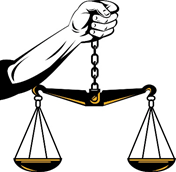
The PSMCCTIA is a Utah law that requires all pawnshops, secondhand businesses, and catalytic converter purchasers that conduct pawn transactions, buy or exchange secondhand or used goods, including catalytic converters, from the public to register with the Division.
Pawnshops, secondhand businesses, and catalytic converter purchasers are required to collect and electronically upload specific consumer and property information into the Central Database.
The PSMCCTIA also explains the rights and responsibilities of pawnshops, secondhand businesses, and catalytic converter purchasers when dealing with law enforcement agencies conducting property theft investigations.

Overview
You may be asking yourself why it's important to know the pawnshop, secondhand business, and catalytic converter purchaser requirements AND the requirements of law enforcement agencies under the PSMCCTIA.
Pawnshops, secondhand businesses, and catalytic converter purchasers and their employees should know the requirements of the law, but should also know what expectations the PSMCCTIA sets for law enforcement agencies when dealing with your business during investigations.
Who We Are

The Division is a state agency located within the Utah Department of Commerce. The Division is tasked with administering and enforcing the PSMCCTIA. This includes:
- Accepting, reviewing, and processing new and renewal applications of pawnshops, secondhand businesses, and catalytic converter purchasers and law enforcement agencies subject to the PSMCCTIA;
- Administering the Central Database;
- Educating pawnshops, secondhand businesses, and catalytic converter purchasers and law enforcement agencies on the requirements of the PSMCCTIA;
- Conducting audits and investigations of businesses subject to the PSMCCTIA; and
- Enforcing the requirements of the PSMCCTIA.
The Central Database
The Utah Central Database (pawn.utah.gov) is an electronic repository created under the PSMCCTIA that allows pawnshops, secondhand businesses, and catalytic converter purchasers to upload seller and property information for each transaction. The information required to be uploaded by each business is stored in the Central Database and is searchable by the Division and law enforcement agencies.
Important items to know about the Central Database:
- The Central Database is managed by a third-party subcontractor for the State of Utah. The Central Database administrators can ONLY answer technical questions regarding uploading requirements, data formatting, file errors, login problems, and data compatibility. All questions regarding registration and compliance with the PSMCCTIA should be directed to the Division.
- The Central Database cannot set up user accounts for a user until AFTER you have properly registered with the Division and paid the registration fee. After registration, a "Primary Contact" account will then be established. The Primary Contact can then add, delete, or reset other individual accounts for their entity.
Who is Considered a Pawnbroker, Secondhand Merchandise Dealer, or Catalytic Converter Purchaser?
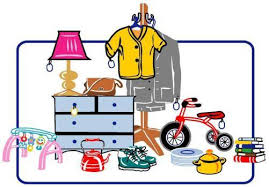
Pawnbroker: A person whose business engages in the following activities:
- engages in a pawn transaction;
- holds itself out as being in the business of a pawnbroker or pawnshop, regardless of whether the person or business enters into pawn transactions or secondhand merchandise transactions.
Secondhand Merchandise Dealer: a person whose business:
- engages in a secondhand merchandise transaction; and
- does not engage in a pawn transaction.
Catalytic Converter Purchaser: A person who purchases a used catalytic converter in a catalytic converter purchase.
Examples include, but are not limited to, purchasers of: Gold, precious metals, or coins; jewelry (including scrap); guns/weapons; videos, DVDs, or games and game consoles; personal electronics; sporting equipment; tools; catalytic converters; etc.
Exemptions
Some businesses and activities are exempt from the requirements of the PSMCCTIA*. These include:
- Antique shops when dealing in antique items;
- Auction houses, flea markets, or vehicle, vessel, and outboard motor dealers;
- Garage sales, yard sales, or estate sales;
- Sale or receipt of secondhand books, magazines, post cards;
- Sale or receipt of non-electronic card games, table-top games, or magic tricks;
- Sale or receipt of secondhand clothing, shoes, furniture, or appliances;
- Businesses that primarily sell used items for the exclusive use of children; and
- Consignment shops when dealing in consigned property.
*Businesses listed above that also purchase or exchange property that is NOT exempt by statute must still register with the Division and upload information about the non-exempt property to the Central Database.
2022 Law Changes
In 2022, the Utah legislature passed House Bill 38, which amended several portions of the PSMCCTIA.
The keys changes include the following points:
- the purchase of used catalytic converters is now regulated under the PSMCCTIA. The law defines who is a "catalytic converter purchaser" and what types of catalytic converter purchases are exempt.
- A catalytic converter purchase is defined as:
"A purchase from an individual of a used catalytic converter that is no longer affixed to a vehicle." - A catalytic converter purchase does not include:
- A purchase of a catalytic converter from a business regularly engaged in automobile repair, crushing, dismantling, recycling, or salvage.
- A purchase of a catalytic converter from a new or used vehicle dealer licensed under Title 41, Chapter 3, Motor Vehicle Business Regulation Act.
- A purchase of a catalytic converter from another catalytic converter purchaser.
- A purchase of a catalytic converter that has never been affixed to a vehicle.
- All catalytic converter purchasers in the state are required to be registered and in compliance with the PSMCCTIA by no later than January 1, 2023.
- Section 104.7 of the PSMCCTIA governs the requirements for catalytic converter purchases, which is slightly different from the requirements for the pawnshops and other secondhand businesses.
- Catalytic converter purchasers may not pay the seller for any catalytic converter transaction with cash or a gift card, unless the amount paid to the seller is under $100.
Properly Filling Out a Pawn or Purchase Ticket
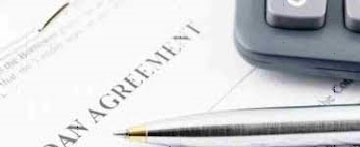
Section 104* of the PSMCCTIA requires that, for each transaction, a pawn or secondhand business MUST create a physical ticket that documents the following information:
- Date and time of the transaction;
- Whether the transaction is a pawn or purchase;
- The ticket number;
- Date ticket must be redeemed (if the property was pawned);
- The following information from the pawner or seller:
- The individual's full name, residence address, date of birth, and telephone number;
- The unique number and type of identification presented during the course of the transaction;
- The individual's signature; and
- An electronic (digital) or tangible (physical) legible fingerprint of the individual's right index finger;
- The amount loaned on or paid for the property, or the trade-in amount;
- The identity of the pawn or secondhand business employee collecting the seller/pawner information; and
- An accurate description of each article of property being pawned or sold to the business, including: identifying marks such as names, brand names, numbers, serial numbers*, model numbers, color, manufacturers' names, and size; metallic composition, and any jewels, stones, or glass; any other marks of identification or indicia of ownership on the property; the weight of the property, if the payment is based on weight; any other unique identifying feature; or gold content, if indicated.
* Automated Recycling Kiosks Operators are subject to Section 104.6 and Catalytic Converter Purchasers are subject to Section 104.7 of the PSMCCTIA.
** If the item is a mobile electronic device with cellular capabilities, you must also record the IMEI number as well as the serial number.
Ticket copies must be maintained by a pawnshop, secondhand business, or catalytic converter purchaser for no less than 3 years from the date of the pawn or secondhand merchandise transaction.
Properly Filling Out a Pawn or Purchase Ticket
Digital Photographs: All pawnshops and secondhand merchandise dealers (other than "coin dealers") are required to obtain DIGITAL photographs, clearly and accurately depicting any of the following property:
- Items bearing identifying marks including serial numbers, engravings, owner labels, or similar identifying marks, with additional photos of the specific identifying marks.
- Each item of jewelry or scrap jewelry, including watches, with additional photos depicting any engravings or other identifying marks.
The digital photographs will be required to be uploaded to the Central Database with the other information required to be uploaded under Section 104 of the PSMCCTIA.
Standards for Digital Fingerprints and Photographs
Fingerprint Scanners — Scanners can be purchased from any vendor of your choosing. However, there are certain standards to look for when purchasing a scanner:
- Scanners need only be for a single right index fingerprint.
- Scanners must be able to scan in a minimum of 500 dpi (dots per inch).
- Scanners must be able to export fingerprints in a 1:1 ratio (scans are actual size).
- Scanners that are FBI PIV-071006 Certified will usually meet the above criteria.
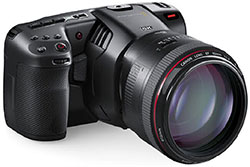
Photographs of items — Photographs can be taken using any type of digital camera equipment. The following standards apply to the photographs uploaded to the Central Database:
- Photographs must be in the JPEG or PNG file format.
- Photographs must be 1MB or smaller in size per photograph.
- Photographs must show the complete item for any item where a photograph is required.
- Additional photographs must also clearly show the markings, serial numbers, and other identifying marks of the item.
- Photographs will be limited to 5 photographs per item.
Examples of acceptable photographs by item type
| A. Item with a serial number (2 photos) | 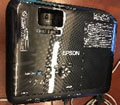 |
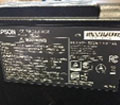 |
|
| B. Items with a serial number and mark of ownership (3 photos) |  |
 |
 |
| C. Item of jewelry (1 photo) | 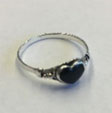 |
||
| D. Item of jewelry with engraving (2 photos) | 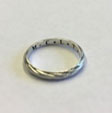 |
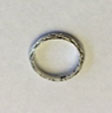 |
Coin Dealers

While a coin dealer is a "secondhand merchandise dealer" under the PSMCCTIA, there are separate requirements for coin dealers in Section 104.5 of the PSMCCTIA regarding information gathered during a transaction.
A "coin dealer" means a person whose sole business activity is the selling and purchasing of numismatic items and precious metals.
Important: If a secondhand merchandise dealer buys and sells coins and commercial grade precious metals, but also buys other used or secondhand property, the secondhand merchandise dealer is NOT considered a coin dealer and is subject to the requirements of Section 104 of the PSMCCTIA rather than Section 104.5.
Coin Dealers
If a coin dealer has NOT PREVIOUSLY conducted a transaction with a perspective customer, the coin dealer must document the following information on the ticket:
- The date and time of the transaction;
- The ticket number;
- The following information regarding the individual who sells the numismatic item or precious metal:
- The individual's full name, residence address, date of birth, and telephone number;
- The unique number and type of identification presented to the coin dealer;
- The individual's signature; and
- An electronic (digital) or tangible (physical) legible fingerprint of the individual's right index finger;
- The amount paid for the item or trade-in value;
- The identification of the employee collecting the seller information; and
- An accurate description of each numismatic item or precious metal being sold to the business, including: identifying marks, type and name of numismatic item or type and content of precious metal; metallic composition, and any jewels, stones, or glass; any other marks of identification or indicia of ownership on the article; the weight of the article, if the payment is based on weight; any other unique identifying feature; and metallic content.
Coin Dealers
Prior Customers-
If a coin dealer has PREVIOUSLY conducted a transaction with a seller, the coin dealer shall collect all the same information for a new customer, except that a coin dealer may choose to only document the initials of the seller, including middle initial if any, and document the last four digits of the unique identifying number on the form of identification.
*The coin dealer must document on the ticket that they have previously conducted a transaction with the seller.*
Acceptable Forms of ID
The PSMCCTIA lists the acceptable forms of ID for pawnshop, secondhand business, or catalytic converter purchaser transactions:
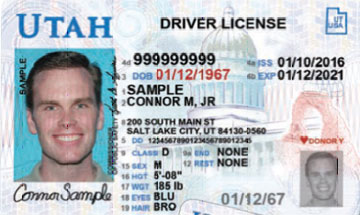
"Identification" means any of the following non-expired forms of identification issued by a state government, the United States government, or a federally recognized Indian tribe, if the identification includes a unique number, photograph of the bearer, and date of birth:
- a United States Passport or United States Passport Card;
- a state-issued driver license;
- a state-issued identification card;
- a state-issued concealed carry permit;
- a United States military identification;
- a United States resident alien card;
- an identification of a federally recognized Indian tribe; or
- a Utah driving privilege card.
Test Question 1
Which of the following forms of identification is NOT an acceptable ID type of a pawner or seller when conducting a pawn or secondhand merchandise transaction?
Uploading Required Transaction Data to the Central Database

For each transaction conducted by a pawnshop, secondhand business, or catalytic converter purchaser, a portion of the information required in Sections 104 ,104.5, and 104.7 must be uploaded to the Central Database within 24 hours of entering into the transaction.
If a computer malfunction occurs that would prevent uploading the required transaction information, a pawnshop, secondhand business, or catalytic converter purchaser must immediately notify the Division and its local law enforcement agency of the malfunction.
If a computer malfunction cannot be resolved within three business days, a pawnshop, secondhand business, or catalytic converter purchaser must notify the Division and its local law enforcement agency, and provide the Division documentation from a reputable computer maintenance company of the reasons why the computer malfunction cannot be resolved within three business days.
Transaction Information Required to be Uploaded to the Central Database

The only information from Section 104 or 104.5 not required to be uploaded is:
- Date the ticket must be redeemed (if a pawn transaction);
- The pawner/seller's signature;
- The identifying information about the pawn or secondhand business employee conducting the transaction; and
- The physical fingerprint on the ticket. (If the fingerprint is digital, it must be uploaded.)
Prohibited Items and Transactions

The PSMCCTIA prohibits pawnshop, secondhand business, or catalytic converter purchaser from pawning or purchasing property under the following circumstances:
- The serial number or another indicia of ownership has been removed, altered, defaced, or obliterated;
- The property (other than a numismatic item) has indicia of being new*, but is not accompanied by a written receipt or other satisfactory proof of ownership other than the seller's own statement;
*Indicia of being new means property that is represented as being new by the pawner/seller, is unopened in the original packaging, or possesses other distinguishing characteristics that indicate the property is new
- The property is a gift card, transaction card, or other physical or digital card or certificate evidencing store credit;
- The pawner or seller is under the age of 18 years old; or
- The pawner or seller appears to be under the influence of alcohol or a controlled substance.
Test Question 2
Which one of the following pawn or purchase scenarios would be acceptable under the PSMCCTIA?
|
|
|
|
|
|
|
|
Holding Periods for Pawn or Purchase Transactions
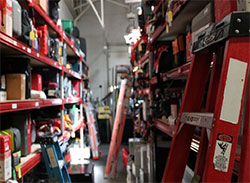
After completing a pawn, secondhand merchandise, or catalytic converter transaction, an item must be held for a minimum of 15 calendar days from the date all required information from Sections 104, 104.5, and 104.7 is properly uploaded to the Central Database, including digital fingerprints and required digital photographs.
NOTE: The hold period does not begin until ALL required information has been properly submitted to the Central Database. If only a portion of the required information is uploaded within the 24-hour period required by Section 106, the hold period does not begin until the remaining transaction information has been properly uploaded, regardless of the pawn or purchase date.
This holding period includes jewelry and scrap jewelry.
This mandatory holding period does not apply to commercial grade precious metals or numismatic (coin) items.
Monitoring Compliance by a Pawnshop, Secondhand Merchandise Dealer, or Catalytic Converter Purchaser
The Division HIGHLY RECOMMENDS regular checks by pawnshops, secondhand merchandise dealers, and catalytic converter purchasers to monitor their own tickets and uploads.
Tickets: Make sure all items are present on the physical tickets as required under Section 104, 104.5, and 104.7.
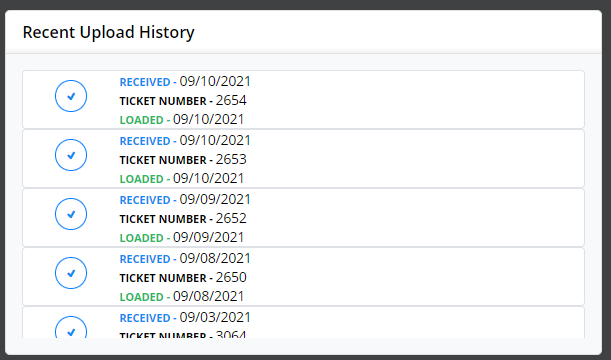
Uploads: The Division has created several tools to help monitor the uploaded files from a pawn or secondhand business' transaction history. After logging into the Central Database, you will see a box on the dashboard entitled "Recent Upload History." This will show the most recent file uploads from your business. Clicking on the box will show the Full Upload History.
Monitoring Compliance by a Pawnshop or Secondhand Merchandise Dealer
Uploads
- By clicking on the "Upload" tab of your account, you can complete a Ticket Entry or File Upload, check the Full Upload History, or view any Upload Errors.
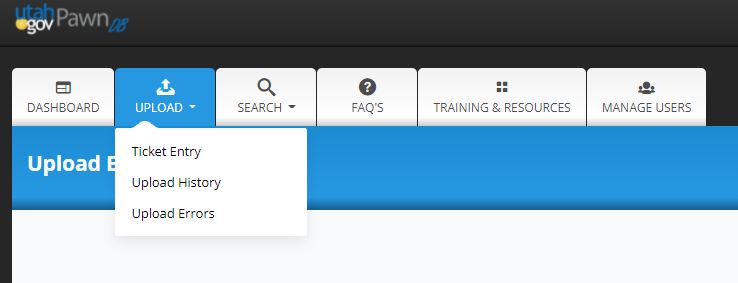
Monitoring Compliance by a Pawnshop, Secondhand Merchandise Dealer, or Catalytic Converter Purchaser
Upload Verification:
- By clicking on the "Search" tab of your account and selecting "Search/Edit Tickets", you can review a specific ticket, see all tickets by date or date range, or see all tickets by a pawner/seller name:
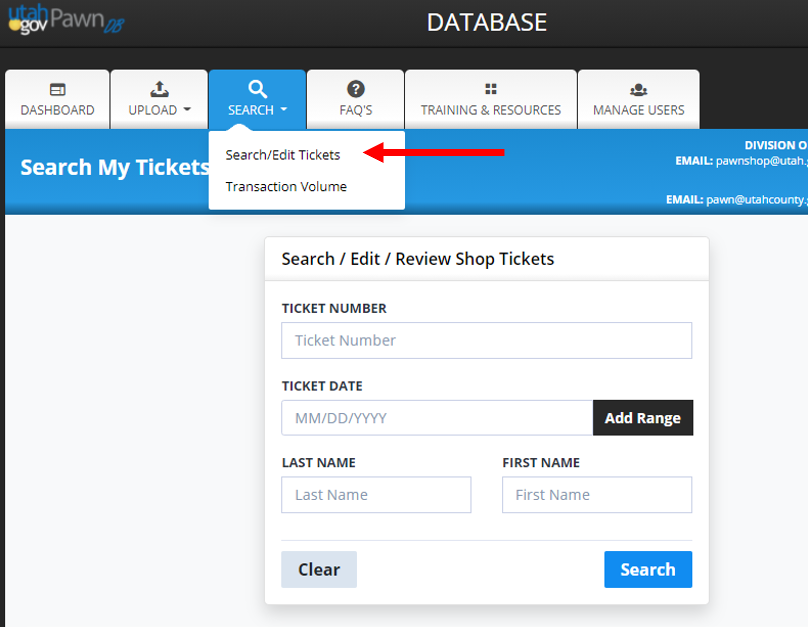
Monitoring Compliance by a Pawnshop, Secondhand Merchandise Dealer, or Catalytic Converter Purchaser
Upload Verification:
- Selecting a date range is the easiest way to quickly review uploaded tickets to ensure all fields are properly being filled out and uploaded to the database. After selecting a date range, you will see a list of your tickets for the specified date range.
- To see all ticket info for a given ticket, you can click on the blue ticket number in the ticket number column. You may also edit a ticket from this screen if incorrect data was entered or data is missing.
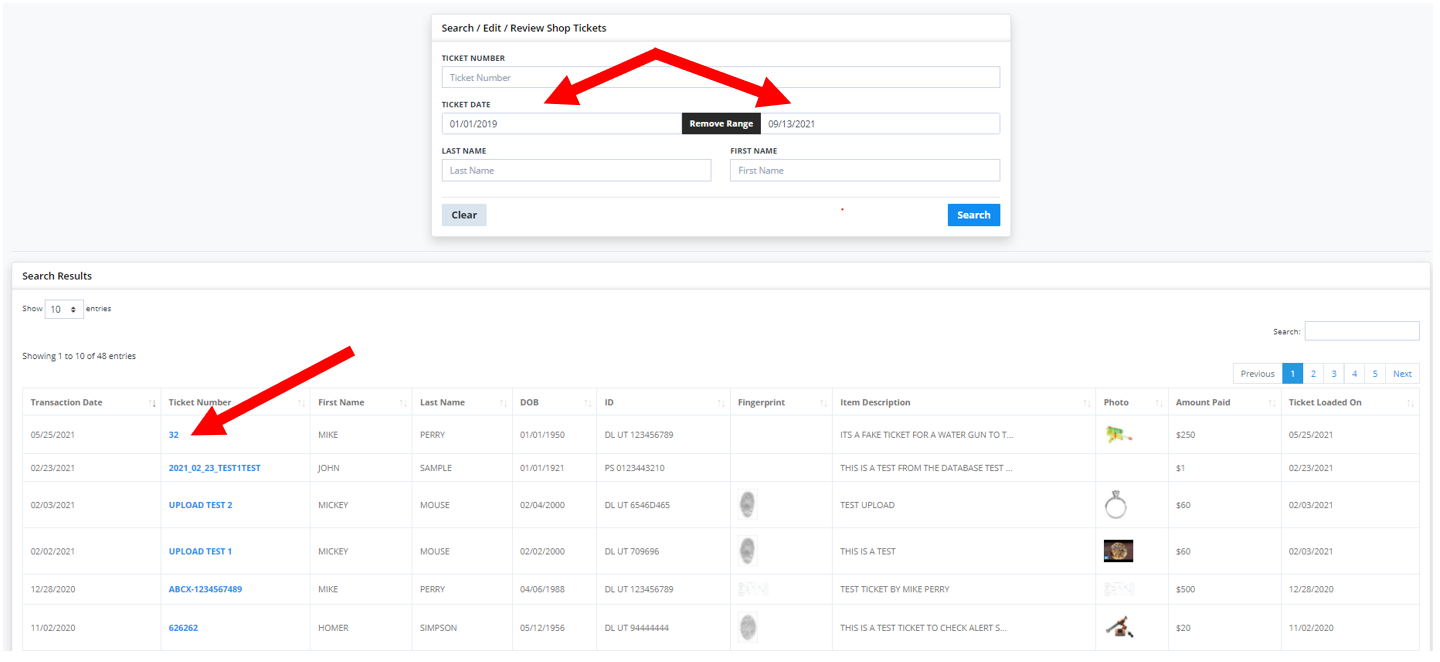
Test Question 3
True or False:
A pawnshop, secondhand business, or catalytic converter purchaser must only hold an item for 15 days after the date of the pawn or purchase even though the pawnshop, secondhand business, or catalytic converter purchaser uploaded the required transaction information four days after the original date of the pawn or purchase.
User Management
Each pawnshop, secondhand business, or catalytic converter purchaser has one or more "Primary Users." The Primary Users are responsible for adding, deleting, resetting, or validating all General Users of the Central Database in their business.
Each General User can manage their account settings by clicking on your name in the top right portion of the database. Here you can see when your password expires and create a new password if expiration is approaching:
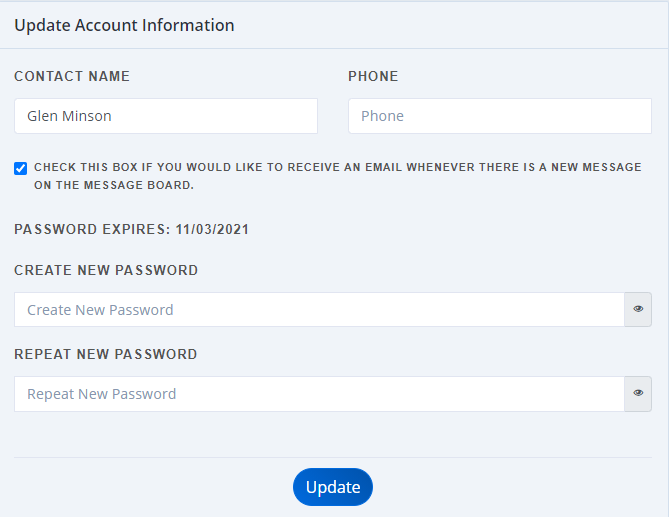
What Happens When a Law Enforcement Agency Finds Potentially Stolen Items in Your Business?
Putting an item or items on hold
A law enforcement agency may find a potentially stolen item or items in your business from a variety of sources. This could happen, for example, if a law enforcement agency finds a stolen item in the Central Database, if the person who stole the item confesses or is found with evidence showing where the item was pawned/sold, or if a victim finds his/her items in the possession of the pawnshop, secondhand business, or catalytic converter purchaser.
A law enforcement agency may put any item on hold for an initial period of 90 days. The hold period may be extended by law enforcement for an additional 90 days thereafter. Any hold longer than 180 days must be authorized by a court order.
When putting an item on hold, the law enforcement agency requesting the hold MUST provide a hold form to the pawnshop, secondhand business, or catalytic converter purchaser. This hold form must provide an active case number, confirm the date of the hold request and the property to be held, and enable the business to track the property when the prosecution takes over the case. An employee or agent of the pawnshop, secondhand business, or catalytic converter purchaser should sign a copy of the hold form acknowledging receipt and a copy thereof should be kept by both the business and the law enforcement officer issuing the hold.
Items placed on hold shall remain in the possession of the pawn or secondhand business unless seized by the law enforcement agency or the law enforcement agency has allowed for the release of the item.
What Happens When Law Enforcement Finds Potentially Stolen Items in Your Shop?
Seizing an item from the pawnshop, secondhand business, or catalytic converter purchaser -
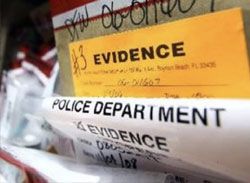
In addition to any hold requirements, a law enforcement agency may seize an item from a pawnshop, secondhand business, or catalytic converter purchaser under the following scenarios:
- The item is required for forensic testing including, but not limited to, fingerprinting, chemical testing, DNA analysis, etc.;
- The item contains unique or sensitive personal identifying information; or
- If exigent circumstances exist.
A seizure form must be filled out by the seizing law enforcement agency and provided to pawnshop, secondhand business, or catalytic converter purchaser from which the item is being seized.
*Hold and Seizure forms may be found on the front page of the Central Database website https://pawn.utah.gov and also inside the Central Database after logging in with your user ID and password. Both law enforcement officers and pawn or secondhand businesses have access to the forms and may print them for use as necessary.*
What Happens When Law Enforcement Finds Potentially Stolen Property in Your Shop?
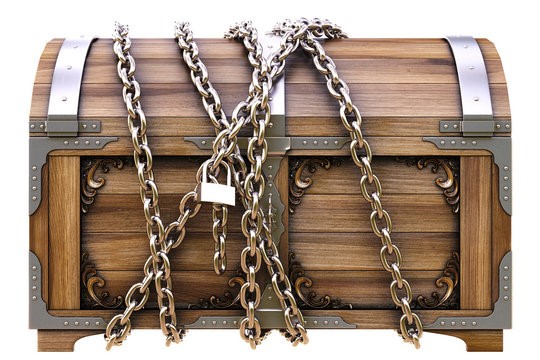
If property is placed on hold, it is MANDATORY the pawnshop, secondhand business, or catalytic converter purchaser maintain custody of the property until an alternative disposition occurs consistent with the PSMCCTIA.
- Failure by a pawnshop, secondhand business, or catalytic converter purchaser to maintain custody of the property on which a hold was placed may subject the business to civil and criminal penalties.
If property is seized by a law enforcement agency, it is MANDATORY that the law enforcement agency maintain custody of the property until an alternative disposition occurs consistent with the PSMCCTIA.
Test Question 4
True or False:
A law enforcement officer or agency shall provide a hold or seizure form to the pawnshop, secondhand business, or catalytic converter purchaser when placing property on a police hold or seizing the property.
Disposition of an Item Placed on Hold or Seized by Law Enforcement
There are only five ways under the PSMCCTIA for property under a hold or seizure to be allocated.
- Prosecutor Release Letter

- If an original victim has been identified as being the owner of property placed on hold or seized by a law enforcement agency
and the original victim has complied with Section 115 of the PSMCCTIA, the law enforcement agency shall at any time during the
course of the investigation:
- Document the property and the original victim who has positively identified the property; and
- Provide the documented information to the prosecuting agency with jurisdiction over the matter to determine if continued possession of the property is necessary for the purposes of any future prosecution.
- If the prosecuting agency determines that continued possession of the property is NOT necessary for prosecution, the prosecuting agency shall provide written or electronic notification to the law enforcement agency that authorizes the return of the property to the original victim.
- The law enforcement agency shall then provide written notice to the pawn or secondhand business that it shall release the property at NO COST to the victim within 15 days or, if the law enforcement agency has previously seized the property, that the property will be released at NO COST to the victim within 15 days.
- A pawnshop, secondhand business, or catalytic converter purchaser may contest the release of the property to the victim by complying with the requirement of Section 116.5 within 15 days of receipt of the notice from the law enforcement agency.
- If an original victim has been identified as being the owner of property placed on hold or seized by a law enforcement agency
and the original victim has complied with Section 115 of the PSMCCTIA, the law enforcement agency shall at any time during the
course of the investigation:
Disposition of an Item Placed on Hold or Seized by Law Enforcement
- Court Ordered
If a criminal case is adjudicated, the court may award the property to any party at its discretion.
- Victim and pawnshop, secondhand business, or catalytic converter purchaser reach a mutual agreement-
There are a few scenarios where it might be appropriate for the pawn or secondhand business and the original victim to reach a mutual agreement for return of the property when a hold or seizure is no longer necessary:
- The victim needs the property back immediately and cannot wait for the prosecutor release letter and is willing to pay for the property;
- The victim is unwilling to cooperate with a law enforcement agency in the criminal investigation and is willing to pay for the property;
- The pawnshop, secondhand business, or catalytic converter purchaser wants to voluntarily release the property back to the victim for no charge;
- A law enforcement agency is unable to secure a prosecutor release letter and the victim is willing to pay for the property.

Disposition of an Item Placed on Hold or Seized by Law Enforcement
- Victim cannot be identified-
- If property was placed on hold or seized, is deemed no longer necessary for investigation or prosecution, and the original owner of the item CANNOT be identified, the law enforcement agency shall notify the business in writing within 15 business days that the hold or seizure has been terminated.
- The law enforcement agency shall return any seized property within that 15 business day time period.
- Hold has expired-
- If a law enforcement agency does not notify a pawnshop, secondhand business, or catalytic converter purchaser that the hold has expired, the business shall send a certified letter to the law enforcement agency that requested the hold indicating that the hold has expired.
- Within 30 days of receipt of the letter, the law enforcement agency shall confirm that the hold period has expired, or provide written notice that a court order has continued the hold period.
- If the law enforcement agency does not respond to the letter from the pawnshop, secondhand business, or catalytic converter purchaser within 30 days, the business may manage the property as if acquired in the ordinary course of business.
Test Question 5
At which of the following times during an investigation may a law enforcement agency or officer seek a prosecutor release letter to return property to a victim that has been identified?
Penalties for Non-Compliance
Violations of the PSMCCTIA are subject to the following penalties:
| Administrative or civil penalty of up to $500 per violation | Class B Misdemeanor |
|---|---|
| Section 13-32a-104, tickets required to be maintained | Section 13-32a-104, ticket required to be maintained |
| Section 13-32a-104.5, database information from coin dealers | Section 13-32a-104.6, database information from automated recycling kiosk operators |
| Section 13-32a-104.6, database information from automated recycling kiosk operators | Section 13-32a-104.7, database information from catalytic converter purchasers |
| Section 13-32a-104.7, database information from catalytic converter purchasers | Section 13-32a-106, transaction information provided to law enforcement |
| Section 13-32a-106, transaction information provided to law enforcement | Section 13-32a-106.5(3)(a), confidentiality of transactions* |
| Section 13-32a-108, retention of records | Section 13-32a-108, retention of records |
| Section 13-32a-109, holding period for property | Section 13-32a-109, holding period for pawned or purchased property |
| Section 13-32a-110.5, transactions with certain individuals prohibited | Section 13-32a-116.5(2), contested disposition of property |
| Section 13-32a-111, fees to fund account | |
| Section 13-32a-112.1, annual training |
*A violation of Section 13-32a-106.5(3)(a) is also subject to a civil penalty of up to $250
Legal for Trade Scales
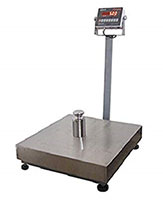
All establishments in Utah who use scales for commercial transactions between two or more parties need to be registered with the State of Utah Weights & Measures Program.
If a scale is used as any part of the determination of monetary value in a given transaction (e.g. buying precious metals, jewelry, scrap jewelry, etc.), the scale is considered to be used commercially.
Use only suitable and legal for trade scales for the transaction. Use only scales that have been tested and approved by a Weights & Measures official. The scale needs to be a model that has been approved for commercial use and is legal for trade. It also needs to be suitable for its intended use in terms of load capacity, unit of measure, scale division size, etc.
For more information on what scales are considered legal for trade, how the certification process works, and how the scales must be used and displayed when used for commercial activity, please contact:
Utah Division of Weights and Measures
350 North Redwood Road
PO Box 146500
Salt Lake City, UT 84114-6500
(801) 538-7100
UDAF-Measures@utah.gov
https://ag.utah.gov/businesses/regulatory-services/weights-measures/
Other important items
- A law enforcement agency or the Division may conduct random reasonable inspections of a pawnshop, secondhand business, or catalytic converter purchaser during normal business hours to monitor compliance with the requirements of the PSMCCTIA.
- Standardized forms for holds, seizures, transaction tickets, spot checks, and hold expirations can be found on the Central Database website: https://pawn.utah.gov
- An orientation packet covering the PSMCCTIA, frequently asked questions, and information for the Pawnshop, Secondhand Merchandise, or Catalytic Converter Advisory Board may be found at the Division's website: https://dcp.utah.gov/businesses/pawnshops.html
Tips for pawnshops, secondhand businesses, or catalytic converter purchasers from the Industry
- Try and develop relationships with your local law enforcement agency. It is likely you will be interacting with them on more than one occasion. No single transaction or investigation is worth a difficult working relationship.
- Do not use abbreviations for the descriptions of property. A law enforcement agency might not know to search the database for certain abbreviations.
- Make sure the spelling is correct for all names, model names, manufacturer names, etc. in your description. Use the Internet to confirm spellings if you are unsure.
- Regularly use the "Search/Edit Tickets" feature to make sure data input is being done correctly and sent properly to the Central Database. You can also edit tickets that have incorrect or missing data. Updates to your company software might cause errors to the file you are sending to the Central Database.
Tips for pawnshops, secondhand businesses, or catalytic converter purchasers from the Industry
- Ask good questions of the pawner/seller regarding how they obtained the property, how long they've had it, why they are getting rid of it, and other questions to determine if the pawner/seller might have stolen the property. Do not conduct a transaction if there is reason to believe the property is stolen or does not belong to the pawner/seller.
- Do NOT lump power tool sets or other combo items together as one item. If a combo set is pawned or sold, each item MUST be individually documented and each serial number must be reported.
- Periodically review your police holds to determine if the holds have expired.